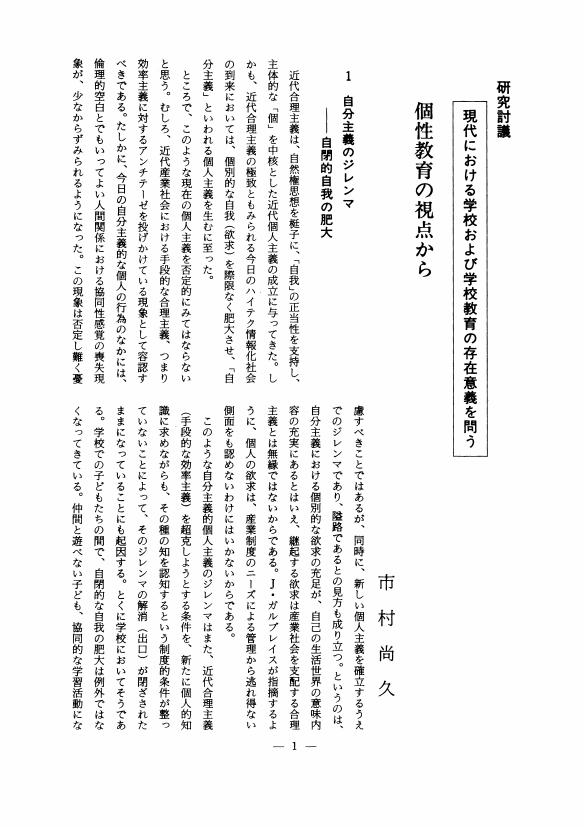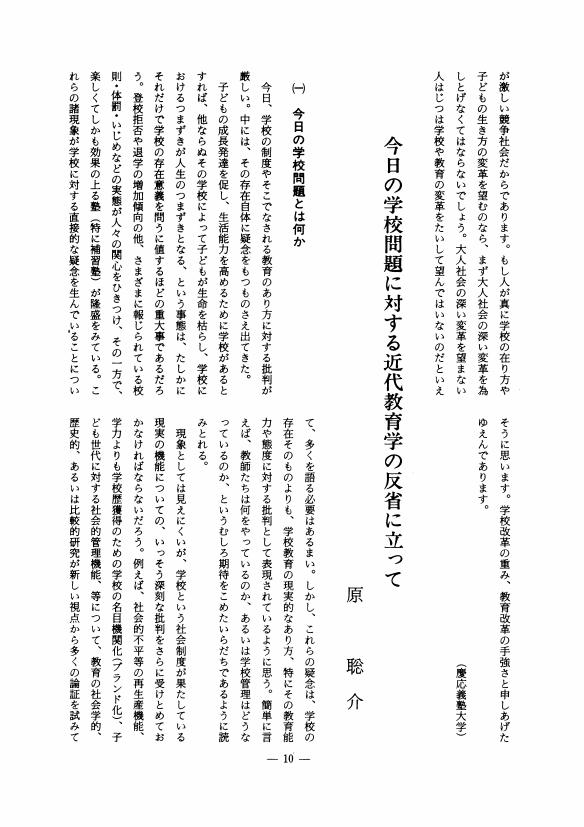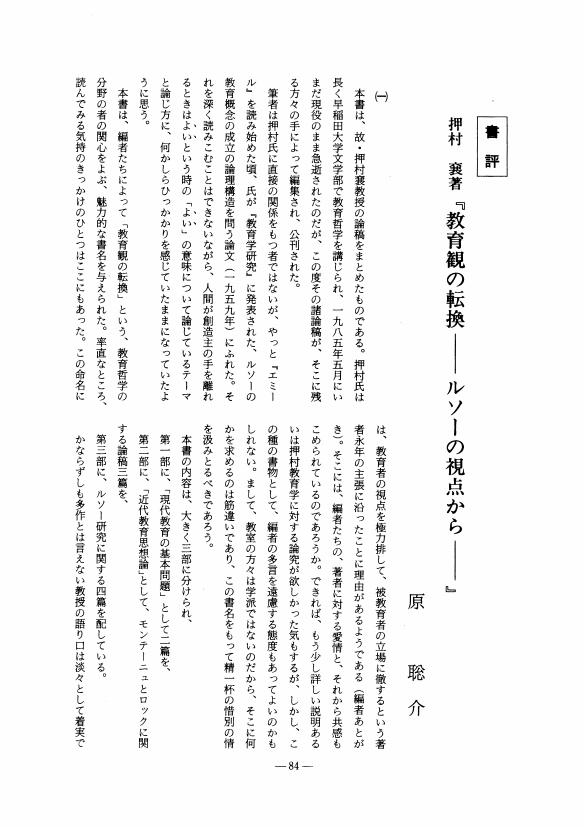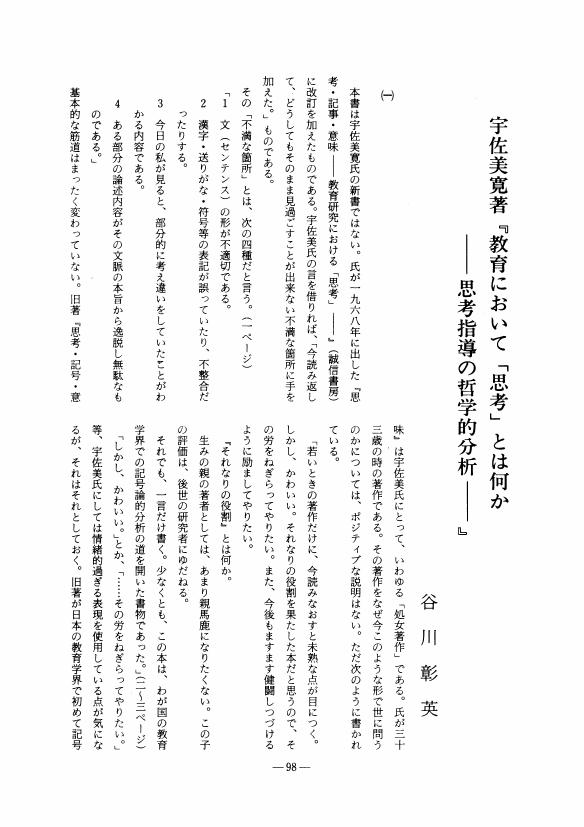1 0 0 0 OA 堀内 守編『教育哲学の諸問題』
- 著者
- 杉浦 宏
- 出版者
- 教育哲学会
- 雑誌
- 教育哲学研究 (ISSN:03873153)
- 巻号頁・発行日
- vol.1988, no.58, pp.84-88, 1988-11-10 (Released:2009-09-04)
1 0 0 0 OA 上田 薫著『人間 その光と影-やわらかさを育てる-』 『教育をゆがめるものはなにか』
- 著者
- 市村 尚久
- 出版者
- 教育哲学会
- 雑誌
- 教育哲学研究 (ISSN:03873153)
- 巻号頁・発行日
- vol.1988, no.58, pp.89-94, 1988-11-10 (Released:2009-09-04)
1 0 0 0 OA 杉浦 宏著『教育学原論』
- 著者
- 田浦 武雄
- 出版者
- 教育哲学会
- 雑誌
- 教育哲学研究 (ISSN:03873153)
- 巻号頁・発行日
- vol.1988, no.58, pp.95-98, 1988-11-10 (Released:2009-09-04)
本書は、著者の「あとがき」で述べているように、「アメリカ教育哲学およびデューイ研究からえたもろもろの理解をもとにして」、教育についての基礎的考察を行ったものである。
1 0 0 0 OA 個性教育の視点から
- 著者
- 市村 尚久
- 出版者
- 教育哲学会
- 雑誌
- 教育哲学研究 (ISSN:03873153)
- 巻号頁・発行日
- vol.1989, no.59, pp.1-4, 1989-05-10 (Released:2009-09-04)
1 0 0 0 OA 今日の学校問題に対する近代教育学の反省に立って
- 著者
- 原 聡介
- 出版者
- 教育哲学会
- 雑誌
- 教育哲学研究 (ISSN:03873153)
- 巻号頁・発行日
- vol.1989, no.59, pp.10-14, 1989-05-10 (Released:2009-09-04)
1 0 0 0 OA 現代文明の危機と学校教育の位相
- 著者
- 安田 忠郎
- 出版者
- 教育哲学会
- 雑誌
- 教育哲学研究 (ISSN:03873153)
- 巻号頁・発行日
- vol.1989, no.59, pp.14-19, 1989-05-10 (Released:2009-09-04)
1 0 0 0 OA シュプランガーの宗教的人間観への一考察
- 著者
- 田代 尚弘
- 出版者
- 教育哲学会
- 雑誌
- 教育哲学研究 (ISSN:03873153)
- 巻号頁・発行日
- vol.1988, no.58, pp.1-14, 1988-11-10 (Released:2009-09-04)
- 参考文献数
- 30
The purpose of this paper is to examine the problem of Spranger's 'view of man'. The clarification of this problem is de facto connected with Spranger's value theory, his ethical and religious ideas. It is noteworthy that Spranger deducts two ethical models from religion. These are the 'expanded ethics' (die erweiternde Ethik) and the 'limiting ethics' (die beschränkende Ethik); both stand in contradiction to each other, hence man experiences an ethical contradiction. But man's character matures by overcoming this ethical contradiction and he becomes the appropriate subject of value judgment and action and thus is able to lead a meaningful life. According to Spranger man realizes that he is protected by God when he listens to the voice of God speaking to him through the conscience. I have characterised this interpretation of the nature of man by Spranger as his religious view of man. This religious view of man forms also one characteristic attribute of Spranger's educational theory.At the background of this religious view of man rests the idea of 'world piety' (Weltfrommigkeit); this implies a salvation from secular worldliness and approaching the Holy, by overcoming the worldly sufferings through living in the world. In my mind, Spranger's religious view of man can make an important contribution to the ethical foundations of contemporary education and to the ethos of the educator.
1 0 0 0 OA ヘルバルトの教師養成論-「教育的タクト」を軸に-
- 著者
- 鈴木 晶子
- 出版者
- 教育哲学会
- 雑誌
- 教育哲学研究 (ISSN:03873153)
- 巻号頁・発行日
- vol.1988, no.58, pp.15-27, 1988-11-10 (Released:2009-09-04)
- 参考文献数
- 74
Der Begriff “pädagogischer Takt” spielt bei Herbart eine wichtige Rolle sowohl als Mittelglied zwischen Theorie und Praxis als auch als Beurteilungs-und Entscheidungsvermogen des Erziehers. Herbart erklart die menschiche Entwicklung durch die dialektische Philosophie der Erfahrung, die eine zirkulare Struktur aufweist. In dieser Struktur wird die Empfänglichkeit für die Sinneseindrücke aktiviert und als Erfahrung internalisiert. Dieser Erfahrungsbestand dient als Grundlage aller weiteren Erfahrungen. Der “pädagogische Takt” fungiert in diesem Erfahrungszirkel als ein konstitutives Moment, wodurch er gleichzeitig verfeinert wird.Um die Erfahrung effektiv zu internalisieren, ist philosophisches Denken über die menschliche Natur und Bildsamkeit sowie die Erziehung notwendig. Aus diesem Grund entwickelt Herbart die topisch-kombinatorische Darstellungsweise der Pädgogik, durch die der Lehrer auf die Praxis vorbereiten kann. Herbarts Werk “Allgemeine Pädagogik” stellt als ein Handbuch für Lehrer eine tastende Annäherung an die Erziehungspraxis dar. Bei der Lehrerausbildung orientiert sich Herbart nicht an der Descarteschen modernen Wissenschaft als Grundlage der auf die Praxis bezogenen Pädagogik, sondern an der klassischen Wissenschaft im Sinne der “ars”.
1 0 0 0 OA J・デューイの教育思想における習慣と道徳の関係に関する一考察
- 著者
- 滝沢 利直
- 出版者
- 教育哲学会
- 雑誌
- 教育哲学研究 (ISSN:03873153)
- 巻号頁・発行日
- vol.1988, no.58, pp.28-40, 1988-11-10 (Released:2009-09-04)
- 参考文献数
- 42
Children today are not only forced to acquire bookish systematic knowledge, but also in the realm of morality are forced to obey school regulations and are taught discipline from a social dimension which has turned petrified and fragmentalised being pervaded by technological mechanisms. As a result, children are floating on a plane of provisional adaptability in their living places, or are in a state of complete deviation.But as Dewey points out, the process of human living is an event arising from an interaction between the individual on one side and environment, habits and customs on the other side. Especially moral education discovers its concrete process in the subjective habit formation in this place of mutual interaction. Even today as in former times, in the children's concrete life situation a fertile ground is to be found inside the habits for the emotions and intelligence. The concrete process of education can discover this in the situation where subjective habits are being formed.
1 0 0 0 OA 「生から問いかけられている者」としての人間 V・フランクルにおけるニヒリズム克服の問題
- 著者
- 諸富 祥彦
- 出版者
- 教育哲学会
- 雑誌
- 教育哲学研究 (ISSN:03873153)
- 巻号頁・発行日
- vol.1988, no.58, pp.41-55, 1988-11-10 (Released:2009-09-04)
- 参考文献数
- 39
This paper tries to clarify the theory of overcoming nihilism in V. Frankl's thought, in particular focusing on his concept of man as a 'Being challenged by life'. A person who becomes a victim of nihilism, is consciously or unconsciously subject to a feeling of interior emptiness (existential emptiness). According to Frankl, this is the consequence of man forgetting the challenge coming to him from life. According to him, the success or failure of overcoming nihilism depends on becoming conscious of the challenge of life, realizing at the end of man's doubting the meaning of life that man is challenged by life. By examining the concept of 'man as a being challenged by life', the following points became clear : Man is challenged by life to discover and realize 'meaning' hidden within the situation he must face constantly. This 'meaning' is something objective, transcending the subject of man, it is a 'concrete Must in the situation' to be realized 'now, here, by his own self'.
- 著者
- 林 泰成
- 出版者
- 教育哲学会
- 雑誌
- 教育哲学研究 (ISSN:03873153)
- 巻号頁・発行日
- vol.1988, no.58, pp.56-69, 1988-11-10 (Released:2009-09-04)
- 参考文献数
- 56
The purpose of this article is to consider the method which is used by R. S. Peters to justify education and to explain it in the light of Wittgenstein's philosophy.First of all, Peters' concept of education and its relation to the concept of value will be made clear. He divided values into extrinsic and intrinsic ones and regards the latter as more important because the explication of extrinsic values cannot arrive at an ultimate justification. Secondley, the 'transcendental argument' is examined because Peters regarded it as a method for clarifying intrinsic values. The 'transcendental argument' comes from Kantian terminology, and “attempts to make explicit what a person is committed to who makes use of his reason in attempting the question 'what ought I to do ? ”'.But it seems that Peters' argumentation is a petitio principii, for he presupposes that 'curriculum activities' include intrinsic values preceding his argumentation. In other words, what a person is committed to who makes use of his reason is assumed to be 'curriculum activities'. According to Wittgenstein, all kinds of justification are included within the limits of a 'language game', and issue in a 'from of life'. From such a point of view, the significance of Peters attempt may lie in the fact that the presumptions of his argumentation indicate that 'language game' and the 'form of life' coincide with curriculum activities'.
1 0 0 0 OA 教育における「治癒」 心理療法モデルの視点から
- 著者
- 三木 博
- 出版者
- 教育哲学会
- 雑誌
- 教育哲学研究 (ISSN:03873153)
- 巻号頁・発行日
- vol.1988, no.58, pp.70-81, 1988-11-10 (Released:2009-09-04)
- 参考文献数
- 46
In diesem Aufsatz wird versucht, das anscheinend bisher wenig berücksichtigte Problem der pädagogischen 'Heilung' anzugehen. Im Bezugauf das Wesen des pädagogischen Aktes oder Verhältnisses nimmt man an, daß es auf dessen Grund eine Wirksamkeit gibt, die man 'heilend' nennen kann. Geleitet vom Interesse an der heilenden Beziehung im weiteren Sinne ist beabsichtigt, die Struktur der Heilung welche ursprünglich zu erzieherischen Ereignissen gehort, und deren Bedeutung zu erfassen.Dabei ist es C. G. Jung's (1875-1961) psychotherapeutische Theorie und sein psychotherapeutisches Modell worauf sich dieser Versuch als Ansatz zur Klärung dieses Problems stützt. Besonders in seiner Theorie des Individuationsprozesses ist die Frage nach Selbstwerdung intensiv verfolgt. Mit dem Kern dieser Frage wird die Logik der Selbsterziehung bzw. Selbstbildung auf die Frage der Selbstheilung zürüchgeführt.Der Topos der Heilung ist eine im ontologischen Sinne erschlossene Dimension. Vom Standpunkt des psychotherapeutischen Modells der Beziehung Heilender-Kranker aus, die auf dieser Dimension beruht, wird die heilende Wirkung, welche im erzieherischen Prozeß tätig ist, als Dimension der Selbstheilung erhellt.
1 0 0 0 OA 教育哲学を考える
- 著者
- 讃岐 和家
- 出版者
- 教育哲学会
- 雑誌
- 教育哲学研究 (ISSN:03873153)
- 巻号頁・発行日
- vol.1988, no.58, pp.82-83, 1988-11-10 (Released:2009-09-04)
1 0 0 0 OA ヘルマン・ノールの教育学における「牧歌的なるもの」の概念
- 著者
- 伊藤 一也
- 出版者
- 教育哲学会
- 雑誌
- 教育哲学研究 (ISSN:03873153)
- 巻号頁・発行日
- vol.1988, no.57, pp.68-81, 1988-05-10 (Released:2009-09-04)
- 参考文献数
- 7
Dieser Aufsatz handelt vom Begriff des 'Idyllischen' in Hermann Nohls Pädagogik.1. Dieser Begriff bezeichnet, nach Nohl, die Geistigkeit, die mit der stillen Freude innerhalb des gegenwärtigen Horizontes ruht und einfaches Dasein des Menschen bejaht und pflegt. Diese Geistigkeit steht in gegensätzlicher Beziehung zum Drang oder Willen, der immer das hohere Leben sucht und danach strebt. Nohl nennt diesen 'faustisch'. Die wesentliche Struktur von Nohls Pädagokik wird in dieser Polarität verstanden.2. In Nohls Pädagokik besteht das Eigenwesen der Erziehung in dem pädagogischen Verhalten, d. i. der pädagogischen Hingabe an Leben und Entwiklung des Kindes. Solche Hingabe ist, nach Nohl, nur auf dem Grund der idyllischen Geistigkeit moglich, und die meisten Kinder entwickeln sich nur gesund und glücklich, wenn sie in dem idyllischen Leben bejaht und gepflegt werden.Nohl spricht von 'einer hoheren Idylle', d. i. einer Idylle im hoheren Leben. Damit wird die Moglichkeit eines neuen Lebensideals, also eines neuen Bildungsideals angedeutet.3. Wenn wir von diesem Gesichtspunkt aus unsere Erziehungssituation betrachten, konnen wir sagen, daß die Wiederherstellung des idyllischen Lebens in unserer Erziehung eine dringende Aufgabe ist.
1 0 0 0 OA 教育哲学を考える
- 著者
- 市村 尚久
- 出版者
- 教育哲学会
- 雑誌
- 教育哲学研究 (ISSN:03873153)
- 巻号頁・発行日
- vol.1988, no.57, pp.82-83, 1988-05-10 (Released:2009-09-04)
1 0 0 0 OA 押村 襄著『教育観の転換-ルソーの視点から-』
- 著者
- 原 聡介
- 出版者
- 教育哲学会
- 雑誌
- 教育哲学研究 (ISSN:03873153)
- 巻号頁・発行日
- vol.1988, no.57, pp.84-87, 1988-05-10 (Released:2009-09-04)
1 0 0 0 OA 市村尚久著『アメリカ六・三制の成立課程-教育思想の側面からの考察-』
- 著者
- 堀内 守
- 出版者
- 教育哲学会
- 雑誌
- 教育哲学研究 (ISSN:03873153)
- 巻号頁・発行日
- vol.1988, no.57, pp.88-91, 1988-05-10 (Released:2009-09-04)
1 0 0 0 OA 堀尾輝久著『天皇制国家と教育-近代日本教育思想史研究-』
- 著者
- 久木 幸男
- 出版者
- 教育哲学会
- 雑誌
- 教育哲学研究 (ISSN:03873153)
- 巻号頁・発行日
- vol.1988, no.57, pp.91-97, 1988-05-10 (Released:2009-09-04)
1 0 0 0 OA 宇佐美寛著『教育において「思考」とは何か-思考指導の哲学的分析-』
- 著者
- 谷川 彰英
- 出版者
- 教育哲学会
- 雑誌
- 教育哲学研究 (ISSN:03873153)
- 巻号頁・発行日
- vol.1988, no.57, pp.98-102, 1988-05-10 (Released:2009-09-04)
1 0 0 0 OA P・H・フェニックス著、佐野安仁・吉田謙二訳『宗教教育の哲学』
- 著者
- 酒井 ツギ子
- 出版者
- 教育哲学会
- 雑誌
- 教育哲学研究 (ISSN:03873153)
- 巻号頁・発行日
- vol.1988, no.57, pp.103-107, 1988-05-10 (Released:2009-09-04)











